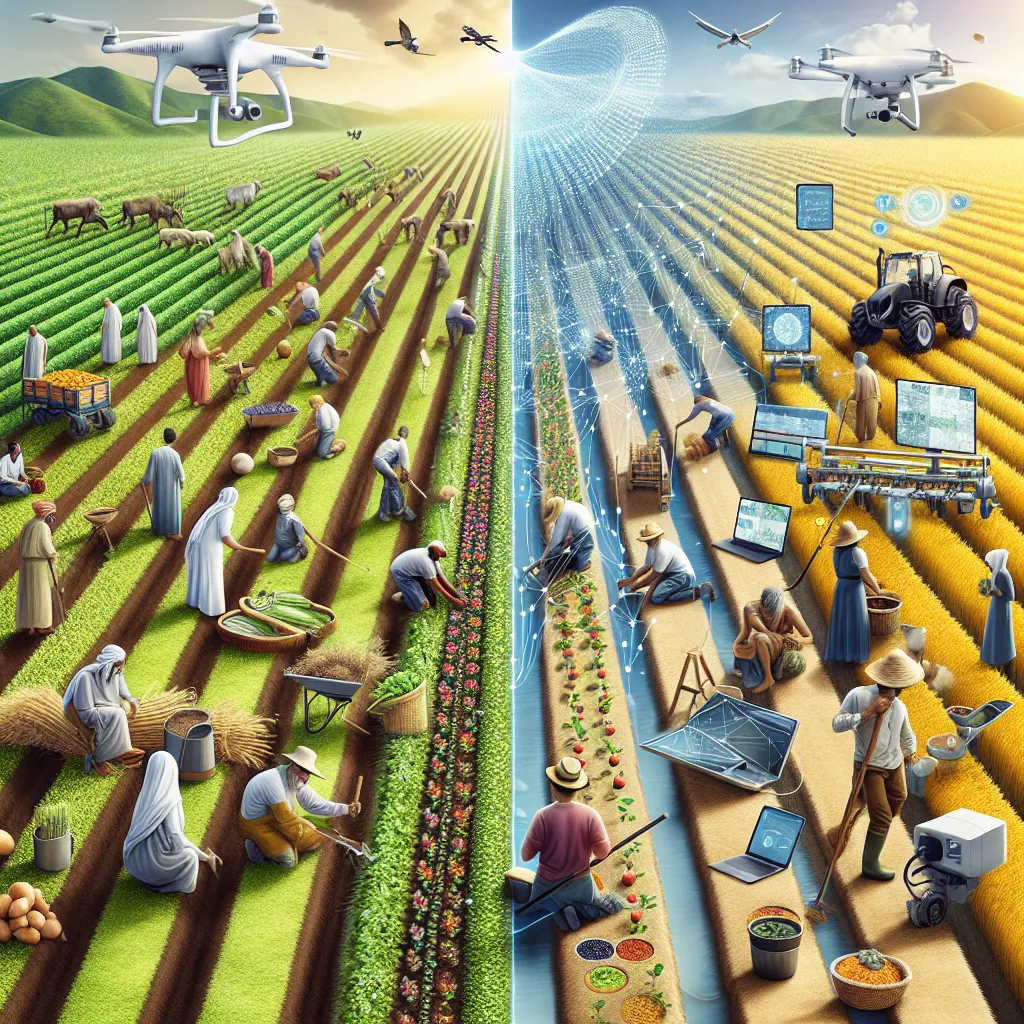The topic of how technology promotes sustainable agriculture is increasingly relevant in IELTS Writing Task 2. Based on recent trends and the growing importance of sustainable farming practices, we can expect this theme to appear more frequently in future exams. Let’s examine a sample question that aligns closely with actual IELTS prompts:
Some people believe that technological advancements are crucial for promoting sustainable agriculture, while others argue that traditional farming methods are more environmentally friendly. Discuss both views and give your own opinion.
Analyzing the Question
This question requires candidates to:
- Discuss the role of technology in promoting sustainable agriculture
- Consider the merits of traditional farming methods
- Provide a balanced argument
- Express a personal opinion
Let’s explore sample essays for different band scores, starting with a high-scoring response.
Sample Essay 1 (Band 8-9)
Advancements in agricultural technology have sparked a debate about their role in promoting sustainable farming practices. While some argue that these innovations are essential for creating a more sustainable food system, others contend that traditional farming methods are inherently more environmentally friendly. In my opinion, a balanced approach that combines modern technology with time-tested traditional practices offers the most promising path toward sustainable agriculture.
Proponents of technological solutions argue that innovations such as precision farming, genetic engineering, and smart irrigation systems can significantly reduce the environmental impact of agriculture while increasing productivity. For example, GPS-guided tractors and drones can optimize the use of fertilizers and pesticides, minimizing waste and reducing chemical runoff into water systems. Additionally, genetically modified crops resistant to pests and diseases can decrease the need for harmful pesticides, contributing to more sustainable farming practices.
On the other hand, advocates of traditional farming methods emphasize the ecological wisdom embedded in age-old practices. They argue that techniques like crop rotation, composting, and natural pest control have stood the test of time and are inherently more sustainable. These methods often require fewer external inputs, promote biodiversity, and maintain soil health over the long term. Moreover, traditional farming practices are often more accessible to smallholder farmers in developing countries, who may lack the resources to adopt expensive technologies.
In my view, the most effective approach to sustainable agriculture lies in combining the best aspects of both modern technology and traditional methods. By integrating advanced technologies with time-honored farming practices, we can create a more resilient and environmentally friendly food production system. For instance, using AI-powered sensors to monitor soil health and water usage while implementing traditional crop rotation techniques can maximize yields while minimizing environmental impact.
In conclusion, while both technological advancements and traditional farming methods have their merits in promoting sustainable agriculture, a synergistic approach that harnesses the strengths of both is likely to be most effective. As we face growing challenges in food security and environmental conservation, it is crucial to embrace innovative solutions while respecting the wisdom of traditional practices.
(Word count: 329)
 Sustainable agriculture technology
Sustainable agriculture technology
Essay Analysis (Band 8-9)
This essay demonstrates excellence across all four marking criteria:
-
Task Response: The essay fully addresses all parts of the task, presenting a well-developed response with relevant, extended, and supported ideas.
-
Coherence and Cohesion: The essay is cohesive with clear progression throughout. It uses a range of cohesive devices and linking words effectively.
-
Lexical Resource: The vocabulary is sophisticated with natural and precise usage. The essay demonstrates a wide range of vocabulary with very few errors.
-
Grammatical Range and Accuracy: The essay uses a wide range of structures with flexibility and accuracy. There are no noticeable grammatical errors.
Key strengths of this essay include:
- Clear introduction that outlines the topic and the writer’s position
- Well-developed paragraphs with clear topic sentences and supporting examples
- Balanced discussion of both viewpoints before presenting a nuanced personal opinion
- Sophisticated vocabulary and complex sentence structures
- Effective use of linking words and phrases to ensure smooth transitions between ideas
Sample Essay 2 (Band 6-7)
In recent years, there has been a debate about whether modern technology or traditional farming methods are better for sustainable agriculture. Some people think that new technologies are very important for making farming more sustainable, while others believe that old-fashioned ways of farming are better for the environment. I will discuss both sides of this argument and give my opinion.
On one hand, technology can help farmers use resources more efficiently. For example, computers and sensors can tell farmers exactly how much water and fertilizer their crops need, which can reduce waste. Also, genetically modified crops can be made to resist pests, which means farmers don’t need to use as many pesticides. These technologies can help produce more food while using fewer resources, which is good for the environment.
On the other hand, traditional farming methods have been used for thousands of years and are often seen as more natural. These methods include things like crop rotation, which helps keep the soil healthy, and using natural predators to control pests instead of chemicals. Many people think these methods are better because they don’t rely on expensive technology and are less likely to harm the environment.
In my opinion, the best approach is to use a combination of new technology and traditional methods. I think modern technology can solve many problems in agriculture, but we shouldn’t forget the lessons learned from traditional farming. By using both, we can create a farming system that is both productive and sustainable.
To conclude, while there are good arguments for both technological and traditional approaches to sustainable agriculture, I believe that a mix of both is the best way forward. This approach can help us produce enough food for the growing world population while also protecting the environment.
(Word count: 289)
Essay Analysis (Band 6-7)
This essay demonstrates good control across the marking criteria but with some limitations:
-
Task Response: The essay addresses all parts of the task and presents a clear position. However, the ideas could be more fully developed and supported.
-
Coherence and Cohesion: The essay is generally well-organized with clear progression. It uses some cohesive devices, but not always with complete flexibility.
-
Lexical Resource: The vocabulary is adequate for the task, with some attempts at more sophisticated words. There is some repetition and occasional awkward word choices.
-
Grammatical Range and Accuracy: The essay uses a mix of simple and complex sentence structures with generally good control. There are some minor errors, but they do not impede communication.
Key aspects of this band 6-7 essay:
- Addresses the task and presents a clear position
- Organizes ideas coherently but with less sophistication than the band 8-9 essay
- Uses some topic-specific vocabulary but with less precision and range
- Demonstrates good grammatical control but with less variety in structures
- Provides examples but they are less fully developed than in higher band essays
Key Vocabulary for IELTS Writing Task 2 on Sustainable Agriculture
-
Sustainable agriculture (noun) /səˈsteɪnəbl ˈæɡrɪkʌltʃər/ – Farming practices that meet current food needs without compromising future generations’ ability to meet their needs.
-
Precision farming (noun) /prɪˈsɪʒn ˈfɑːmɪŋ/ – The use of technology to optimize field-level management for improved crop performance and environmental quality.
-
Genetically modified crops (noun phrase) /dʒəˈnetɪkli ˈmɒdɪfaɪd krɒps/ – Crops whose DNA has been altered using genetic engineering techniques.
-
Crop rotation (noun) /krɒp rəʊˈteɪʃn/ – The practice of growing different types of crops in the same area in sequenced seasons.
-
Biodiversity (noun) /ˌbaɪəʊdaɪˈvɜːsəti/ – The variety of plant and animal life in a particular habitat or ecosystem.
-
Pesticide runoff (noun phrase) /ˈpestɪsaɪd ˈrʌnɒf/ – The movement of pesticides through the soil or across land, often ending up in water sources.
-
Smart irrigation (noun phrase) /smɑːt ˌɪrɪˈɡeɪʃn/ – Advanced irrigation systems that use sensors and weather data to optimize water usage.
-
Agroecology (noun) /ˌæɡrəʊiˈkɒlədʒi/ – The study of ecological processes applied to agricultural production systems.
-
Soil health (noun phrase) /sɔɪl helθ/ – The continued capacity of soil to function as a vital living ecosystem that sustains plants, animals, and humans.
-
Sustainable intensification (noun phrase) /səˈsteɪnəbl ɪnˌtensɪfɪˈkeɪʃn/ – Increasing agricultural production while minimizing environmental impact and resource use.
Conclusion
The topic of technology’s role in promoting sustainable agriculture is likely to remain relevant in IELTS Writing Task 2. Future questions might explore specific technologies, the economic implications of sustainable farming, or the role of government policies in promoting sustainable agricultural practices.
To prepare for such topics, consider practicing essays on:
- The impact of AI and robotics on sustainable farming
- Balancing food security and environmental conservation in agriculture
- The role of urban farming technologies in sustainable food production
- Challenges in implementing sustainable agricultural practices in developing countries
Remember, the key to success in IELTS Writing Task 2 is to address all parts of the question, provide relevant examples, and express your ideas clearly and coherently. Practice writing essays on these topics and share them in the comments section below for feedback and discussion. This active practice will help you improve your writing skills and prepare effectively for the IELTS exam.


